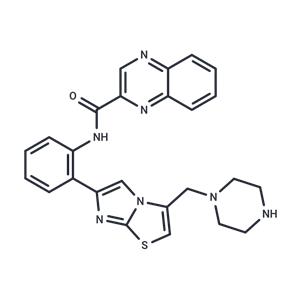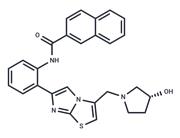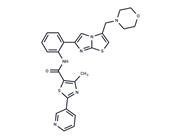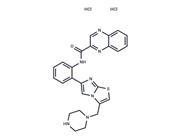| Name | SRT 1720 |
| Description | SRT 1720 is a selective activator of human SIRT1 (EC1.5: 0.16 μM) and exhibits more than 230-fold lower potency for SIRT2 and SIRT3. |
| Animal Research | Nine-week-old C57BL/6 male mice are fed a high-fat diet (60% calories from fat) until their mean body weight reaches approximately 40 g. The mice are then divided into test groups (6-10 per group). SRT1460 (100 mg/kg), SRT1720 (100 mg/kg), SRT501 (500 mg/kg) and rosiglitazone (5 mg/kg) are administered once daily via oral gavage. The vehicle used is 2% HPMC + 0.2% DOSS. Individual mouse body weights are measured twice weekly. At 2, 4, 6, 8 and 10 weeks of dosing a fed blood glucose measurement are taken and after 5 weeks of treatment, an IPGTT is conducted on all mice from each of the groups. After 10 weeks of treatment, an ITT is conducted. Statistical analysis is completed using the JMP program. Data are analyzed by a one way ANOVA with a comparison to control using a Dunnett's Test. A p-value < 0.05 indicates a significant difference between groups. |
| In vitro | The maximum activation ratio of SRT1720 versus the closest sirtuin homologs, SIRT2 (EC1.5 = 37 μM) and SIRT3 (EC1.5 > 300 μM) is up to 781%. SRT1720 binds to the SIRT1 enzyme-peptide substrate complex at an allosteric site amino-terminal to the catalytic domain and lower the Michaelis constant for acetylated substrates. Higher concentrations of SRT1720 (15 μM) induces a modest (10-20%) decrease in normal cell viability. SRT1720 also significantly inhibits VEGF-dependent MM cell migration [1]. |
| In vivo | SRT 1720 (10, 30, 100 mg/kg, p.o.) significantly reduces hyperinsulinemia after 4 weeks, partially normalizing insulin levels akin to rosiglitazone treatment, reduces fasting blood glucose to near normal levels in Lepob/ob mice[1], protects against diet-induced obesity in mice by modulating metabolic adaptation through SIRT1 targets such as PGC1α and FOXO1[2], and during emphysema development (50-100 mg/kg, p.o.), attenuates elastase-induced airspace enlargement and lung function impairment, and reduces arterial oxygen saturation in WT mice[3]. |
| Storage | Powder: -20°C for 3 years | In solvent: -80°C for 1 year | Shipping with blue ice. |
| Solubility Information | DMSO : 1 mg/mL
|
| Keywords | inhibit | Inhibitor | SRT1720 | SRT-1720 | Sirtuin | Autophagy | SRT 1720 |
| Inhibitors Related | Stavudine | Xylitol | Myricetin | Sodium 4-phenylbutyrate | Hydroxychloroquine | Guanidine hydrochloride | Taurine | Curcumin | Oxyresveratrol | Paeonol | Naringin | Gefitinib |
| Related Compound Libraries | Histone Modification Compound Library | Bioactive Compound Library | Epigenetics Compound Library | Anti-Diabetic Compound Library | NO PAINS Compound Library | Mitochondria-Targeted Compound Library | Anti-Aging Compound Library | Bioactive Compounds Library Max | Anti-Cancer Compound Library | Anti-Cancer Active Compound Library |

 United States
United States



